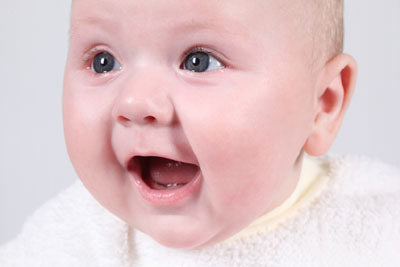Baby Dental Care Tips
It goes without saying that your baby’s teeth need care and brushing as soon as they come up when the little darling is past the first half-year, but the latest rundown from the scientists states that you should start proper care of milk teeth even before they are there!

Having found an unexpectedly great amount of bacteria teeming in infants’ mouths, scientists concluded that babies’ toothless gums need washing and cleaning which will help escape development of dental cavities at a later age.
Boffins from the University of Illinois carried out research of infants before they have started growing teeth and compared the findings with the results of studies of babies and children who had their teeth treated for cavities. They employed DNA research technologies to explore the mouth and were surprised to find an enormous and active bacteria population that could easily lead to earlier formation of cavities.
Lead researcher Professor Kelly Swanson accentuated that most diseases, including teeth diseases, occur due to a diverse community of bacteria and not just one special kind of bacteria, and the discovery of a large amount of those poses a definite threat to oncoming teeth. If scientists dated the “window of infectivity” at the age from 19 to 33 months before, they are now forced to conclude that this potentially dangerous period may begin much earlier. It is reported that in the US 40% of little ones have cavities in their teeth by the age of three.
It ought to be mentioned that babies who are breastfed on a regular basis are much less threatened because antibodies and antitoxins in breast milk keep down the bacteria population.
More sugary kinds of infant formulas as well as drinks and snack food containing fermentable sugars, on the other hand, increase the risk of teeth decay, therefore The American Academy of Pediatric Dentistry urges mothers to clean their toothless babies’ gums.
Dental experts in Britain offer no such advice. Janet Clarke, a spokeswoman for the British Dental Association, while recognizing the scientific value of the study, said that it requires further research to furnish a conclusive proof of the veracity of the findings. For the time being the Brits believe keeping the baby off sugary drinks and snacks after the baby has been weaned is a more important factor for teeth health.
The worst situation for teeth, Ms. Clarke pointed out, is when babies keep sucking and sipping at sugary drinks and foods from a carton for a period of time, because teeth suffer most when they are exposed to a frequent or long-time contact with sugar. Each suchlike contact results in about half-hour’s process when acid issues forth in the mouth causing teeth decay.
It is better to have a one-time drink from a cup or a glass – while the best bet for healthy gums and teeth remains to have drinks and foods with no sugar additives.
Source of the image: Photl.
